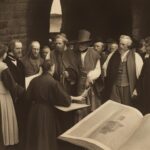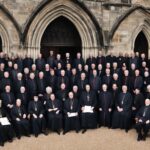Protestantism, a diverse branch of Christianity, emerged from the Protestant Reformation in the 16th century. It emphasizes faith, grace, and scripture. Within Protestantism, there are several major branches, each with its own unique beliefs, history, and impact within Christianity.
These branches, also known as Protestant denominations or sects, contribute to the vibrant tapestry of Protestantism and play a significant role in shaping the global religious landscape. Understanding the diversity within Protestantism is essential to gaining a comprehensive understanding of Christianity as a whole.
Key Takeaways:
- Protestantism emerged from the Protestant Reformation in the 16th century.
- There are several major Protestant branches, each with its own unique beliefs and history.
- These branches include evangelical Protestantism, mainline Protestantism, historically black Protestantism, and more.
- Protestant denominations or sects contribute to the vibrant tapestry of Protestantism.
- Understanding the diversity within Protestantism is crucial for understanding Christianity as a whole.
Evangelical Protestantism
Evangelical Protestantism is a vibrant branch of Christianity that places a strong emphasis on personal conversion and the authority of the Bible. It encompasses various denominations, including Baptist, Methodist, Pentecostal, and Lutheran churches. Evangelical Protestants believe in the transformative power of faith in Jesus Christ and actively seek to spread the message of salvation to others.
One of the defining characteristics of evangelical Protestantism is its commitment to evangelism and missions. Evangelicals believe in the Great Commission, the commandment of Jesus to reach out and share the good news with people from all walks of life. This dedication to spreading the gospel has led to the establishment of numerous evangelical organizations, both local and international, that focus on reaching the lost and igniting spiritual growth.
In addition to evangelism, personal spiritual growth is highly valued within evangelical Protestantism. Many churches offer small groups, Bible studies, and discipleship programs to nurture believers in their faith. Prayer and worship also play a central role in the lives of evangelical Christians, as they seek to cultivate a deep and intimate relationship with God.
Overall, evangelical Protestantism is characterized by its fervent devotion to the teachings of the Bible, its commitment to evangelism and missions, and its emphasis on personal transformation through faith in Jesus Christ.
Key Denominations in Evangelical Protestantism:
| Denomination | Beliefs | Major Figures |
|---|---|---|
| Baptist | Emphasis on believer’s baptism and congregational autonomy | Charles Spurgeon, Billy Graham |
| Methodist | Wesleyan theology, belief in sanctification and social justice | John Wesley, Francis Asbury |
| Pentecostal | Belief in the baptism of the Holy Spirit and spiritual gifts | Charles Parham, William Seymour |
| Lutheran | Teachings of Martin Luther, emphasis on grace through faith alone | Martin Luther, Dietrich Bonhoeffer |
Mainline Protestantism
Mainline Protestantism refers to the more established and traditional Protestant denominations, including Anglican, Presbyterian, and Methodist churches. These denominations have historically held a prominent role in society and have often been associated with political and cultural influence. Mainline Protestants emphasize social justice, inclusivity, and intellectual engagement. They may have more liberal theological views compared to other branches of Protestantism.
Anglican Church
The Anglican Church, also known as the Episcopal Church in the United States, is part of the worldwide Anglican Communion. Founded in England during the Reformation, it has a hierarchical structure with bishops and archbishops. Anglicans place a strong emphasis on liturgy, sacraments, and tradition. The church allows for a range of theological perspectives and has a diverse membership.
Presbyterian Church
The Presbyterian Church is characterized by a representative system of church governance. It is led by elders and governed by regional bodies called presbyteries. The church places a strong emphasis on biblical authority, theological education, and democratic decision-making. Presbyterians believe in the sovereignty of God and the importance of community and social justice.
Methodist Church
The Methodist Church traces its origins back to the ministry of John Wesley in the 18th century. Methodists emphasize the importance of personal faith, discipleship, and social holiness. They believe in the possibility of experiencing God’s grace and salvation in this life. Methodists have a connectional structure with bishops and a strong commitment to missions and social outreach.
| Denomination | Beliefs | Governance | Key Practices |
|---|---|---|---|
| Anglican | Emphasis on liturgy, sacraments, and tradition | Hierarchical structure with bishops and archbishops | Wide range of theological perspectives |
| Presbyterian | Strong emphasis on biblical authority and theological education | Representative system of church governance | Democratic decision-making, community, and social justice |
| Methodist | Emphasis on personal faith, discipleship, and social holiness | Connectional structure with bishops | Commitment to missions and social outreach |
Mainline Protestantism, represented by Anglican, Presbyterian, and Methodist churches, encompasses a rich tradition rooted in history, theology, and social engagement. These denominations have shaped the religious landscape and have contributed to various social justice movements. The emphasis on inclusivity, intellectual engagement, and community involvement distinguishes mainline Protestantism from other branches of Christianity.

Historically Black Protestantism
Historically Black Protestantism is a significant branch of Protestantism that emerged within the African American community during slavery and segregation. This branch encompasses various denominations, including the African Methodist Episcopal (AME) Church and several Baptist associations. Historically Black Protestantism has played a crucial role in the fight for civil rights and continues to prioritize issues of social justice and community empowerment.
“Our people have a rich history of faith that has sustained us through the darkest times. The church has been a beacon of hope and a catalyst for change in our communities,” says Reverend James Johnson, a pastor in the AME Church.
The Baptist tradition within historically Black Protestantism has deep roots in the African American community, with the Baptist Missionary Association being one of the prominent organizations. These Baptist churches focus on spiritual growth, personal transformation, and community engagement. They have fostered a sense of unity, empowerment, and resilience among African Americans.
Key Characteristics of Historically Black Protestantism:
- Rooted in the African American community
- Strong emphasis on social justice and civil rights
- Empowerment through spirituality and community involvement
- Significant presence of Baptist and AME churches
| Denomination | Key Beliefs | Significant Figures |
|---|---|---|
| African Methodist Episcopal Church (AME) | Emphasizes social justice, community service, and spiritual growth | Richard Allen, Jarena Lee |
| Baptist Missionary Association | Focuses on evangelism, personal transformation, and community engagement | Booker T. Washington, Martin Luther King Jr. |
| Other Baptist Associations | Various Baptist associations with historical significance in the African American community | N/A |
Other Protestant Branches
While evangelical Protestantism, mainline Protestantism, and historically black Protestantism are some of the major branches in Christianity, there are other Protestant denominations that offer unique perspectives and beliefs. These include Anabaptist, Quaker, and Reformed churches.
Anabaptist
Anabaptist churches originated during the 16th century as part of the Radical Reformation. They emphasize the importance of adult baptism and the voluntary nature of church membership. Anabaptists believe in the separation of church and state, pacifism, and the community of believers. Some well-known Anabaptist groups include the Mennonites and the Amish.
Quaker
Quaker churches, also known as the Religious Society of Friends, have a distinct worship style characterized by silent meetings and waiting for the inner light of the Holy Spirit to guide them. Quakers emphasize the belief in the equality of all people and value simplicity, peace, and social justice. Their contributions to issues such as abolitionism and women’s rights have been significant.
Reformed
Reformed churches, also known as Calvinist churches, follow the theological teachings of John Calvin. They emphasize the sovereignty of God, the authority of scripture, and the doctrine of predestination. Reformed churches, such as Presbyterian and Reformed Baptist churches, have a strong emphasis on theological education and intellectual engagement.
These other Protestant branches offer diverse perspectives and contribute to the rich tapestry of Christianity. Their unique beliefs and practices provide individuals with a range of options to explore and find spiritual fulfillment.

| Protestant Branch | Beliefs | Focus |
|---|---|---|
| Anabaptist | Adult baptism, community of believers, separation of church and state, pacifism | Community, peaceful living, church-state separation |
| Quaker | Equality, simplicity, peace, social justice | Silent worship, inner light, social activism |
| Reformed | Sovereignty of God, authority of scripture, predestination | Theological education, intellectual engagement |
Size and Demographics of Protestant Branches
Understanding the size and demographics of Protestant branches is essential to grasp the influence and reach of these religious traditions. Here, we will explore some of the major Protestant denominations and their respective membership numbers.
Firstly, the Southern Baptist Convention stands out as one of the largest Protestant denominations in the United States. With over 14 million members, it represents a significant portion of the Protestant population in the country. The convention follows conservative theological beliefs and has a strong emphasis on evangelism and missions.
Another prominent denomination is the United Methodist Church, which has a substantial presence both nationally and globally. With approximately 12 million members worldwide, it is known for its inclusive and diverse congregation. The United Methodist Church prioritizes social justice initiatives and offers a broad range of ministries and outreach programs.
Within the historically Black Protestant tradition, the African Methodist Episcopal Church (AME Church) plays a vital role. With around 3 million members, it has been instrumental in championing civil rights and social justice issues. The AME Church places a strong emphasis on community empowerment and spiritual growth.

Table: Membership Statistics of Selected Protestant Denominations
| Denomination | Membership |
|---|---|
| Southern Baptist Convention | 14 million |
| United Methodist Church | 12 million |
| African Methodist Episcopal Church (AME Church) | 3 million |
| Lutheran Church-Missouri Synod | 2 million |
In addition to these denominations, the Lutheran Church-Missouri Synod represents a significant conservative Lutheran presence with approximately 2 million members. It upholds traditional teachings and practices within Lutheranism.
These numbers provide a glimpse into the diverse landscape of Protestantism and the varying sizes of different denominations. It is important to note that these statistics are approximate and can fluctuate over time, reflecting changes in religious affiliation and membership trends.
Impact of Protestant Branches in America
Protestant branches have had a profound impact on American society and culture. One notable influence is their involvement in promoting social justice, with mainline Protestant churches playing a key role in movements such as the civil rights movement. These churches have consistently advocated for equal rights and have been at the forefront of addressing issues of racial discrimination. Their commitment to social justice has helped shape the values and norms of American society.
Another significant impact of Protestant branches in America is the influence of evangelical Protestantism on politics. Evangelical Christians, known for their strong faith and adherence to biblical teachings, have been associated with the Christian Right. This political movement has championed conservative values and has exerted significant influence in shaping policy debates on issues such as abortion, same-sex marriage, and religious freedom.
“The Christian Right has been a powerful force in American politics, mobilizing millions of voters and shaping the political landscape in areas such as abortion, same-sex marriage, and religious freedom.” – Reverend John Anderson, theologian
Protestantism as a whole has played a pivotal role in shaping the religious landscape of America. With its diverse branches and denominations, Protestantism offers a range of beliefs, practices, and interpretations of Christian principles. This diversity has contributed to the vibrancy and dynamism of American religious life, providing individuals with a wide array of choices and expressions of faith. The impact of Protestant branches in America is far-reaching and continues to shape the nation’s social, political, and cultural fabric.

Table: Major Protestant Branches and their Impact
| Branch | Impact |
|---|---|
| Evangelical Protestantism | Strong influence on American politics and cultural values |
| Mainline Protestantism | Leadership in social justice movements like the civil rights movement |
| Historically Black Protestantism | Significant role in the fight for civil rights and community empowerment |
| Other Protestant Branches | Contributions to religious diversity and theological discourse in America |
Table: A summary of the major Protestant branches and their impacts in America.
Global Reach of Protestantism
The impact of Protestantism extends far beyond its origins in the 16th century Reformation. Today, Protestantism has a significant global reach, with adherents in many countries around the world. The spread of Protestantism can be attributed to various factors, including missions, evangelism, and globalization.
One of the key aspects of global Protestantism is the movement of Global Evangelicalism. This movement emphasizes the importance of evangelism and missions, seeking to spread the message of the Gospel to all corners of the world. Through missionary work, Protestant denominations have reached remote areas and diverse cultures, contributing to the growth and establishment of Protestant communities worldwide.
Protestant missions have played a crucial role in the expansion of Christianity beyond its European roots. Missionaries from different Protestant denominations have ventured into new territories, building churches, translating the Bible, and sharing their beliefs with local populations. These missions have not only resulted in the establishment of Protestant churches in various countries but have also contributed to the development of educational and healthcare institutions.
| Global Protestant Denominations | Approximate Number of Adherents |
|---|---|
| Lutheran | 74 million |
| Baptist | 70 million |
| Methodist | 47 million |
| Pentecostal | 279 million |
“Protestant missions have been instrumental in spreading Christianity to diverse regions, contributing to the growth of Protestantism in different parts of the world.”
The global reach of Protestantism is not limited to specific regions or cultures. Protestant denominations have established themselves in countries across the globe, including Africa, Asia, and Latin America. This global presence has led to the development of unique expressions of Protestantism, often influenced by local customs and traditions.
In summary, Protestantism has a global reach that extends beyond its European origins. Through missions, evangelism, and globalization, Protestant denominations have spread throughout the world, establishing communities and contributing to the growth of Christianity in diverse cultures. The impact of Protestantism can be seen in the millions of adherents and the diverse expressions of faith found in different regions.

Conclusion
In summary, Protestantism encompasses several major branches within Christianity, each with its own unique beliefs, histories, and impacts on society. Evangelical Protestantism emphasizes personal conversion and the authority of the Bible, with denominations such as Baptist, Methodist, Pentecostal, and Lutheran. Mainline Protestantism, represented by Anglican, Presbyterian, and Methodist churches, focuses on social justice, inclusivity, and intellectual engagement. Historically Black Protestantism, including the African Methodist Episcopal (AME) Church and various Baptist associations, has been instrumental in the civil rights movement and continues to prioritize social justice.
Additionally, there are other Protestant branches that deserve recognition. Anabaptist churches emphasize adult baptism and community of believers, while Quaker churches highlight silence and direct experience of God. Reformed churches, influenced by the theology of John Calvin, form a separate branch within Protestantism.
Understanding the diversity within Protestantism is essential for a comprehensive understanding of Christianity as a whole. These major branches have made significant contributions to the Christian faith and have had a profound influence on society. Whether it is the strong focus on evangelism and personal spiritual growth in evangelical Protestantism, the emphasis on social justice in mainline Protestantism, or the pivotal role of historically Black Protestantism in the civil rights movement, each branch has added a unique flavor to the tapestry of Christianity.
FAQ
What are the major branches of Protestantism?
The major branches of Protestantism include evangelical Protestantism, mainline Protestantism, historically black Protestantism, and other branches such as Anabaptist, Quaker, and Reformed.
What is evangelical Protestantism?
Evangelical Protestantism is a branch of Protestantism that emphasizes personal conversion and the authority of the Bible. It includes denominations such as Baptist, Methodist, Pentecostal, and Lutheran.
What is mainline Protestantism?
Mainline Protestantism refers to the more established and traditional Protestant denominations, including Anglican, Presbyterian, and Methodist churches. These denominations emphasize social justice, inclusivity, and intellectual engagement.
What is historically black Protestantism?
Historically black Protestantism is a branch of Protestantism that originated in the African American community during slavery and segregation. It includes denominations such as the African Methodist Episcopal (AME) Church and various Baptist associations. Historically black Protestants prioritize issues of social justice and community empowerment.
Are there other Protestant branches?
Yes, besides evangelical, mainline, and historically black Protestantism, there are other branches such as Anabaptist churches, which emphasize adult baptism and community of believers, as well as Quaker churches known for their emphasis on silence and direct experience of God. Reformed churches, influenced by the theology of John Calvin, also exist as a separate branch within Protestantism.
How large are the major Protestant denominations?
The Southern Baptist Convention is one of the largest Protestant denominations in the United States. The United Methodist Church has a significant presence worldwide. The African Methodist Episcopal Church is a prominent historically black Protestant denomination. The Lutheran Church-Missouri Synod represents a number of conservative Lutheran congregations.
What impact have Protestant branches had on American society?
Mainline Protestant churches have played a role in promoting social justice and have been involved in movements such as the civil rights movement. Evangelical Protestantism has had a strong influence on American politics and has been associated with the Christian Right. Protestantism as a whole has shaped the American religious landscape and continues to be a major force in the country.
How far-reaching is Protestantism?
Protestantism has spread throughout the world and has a significant presence in many countries. Global Evangelicalism refers to the global movement of evangelical Protestant churches, with a particular emphasis on evangelism and missions. Protestant missions have been instrumental in spreading Christianity to diverse regions, contributing to the growth of Protestantism in different parts of the world.
















